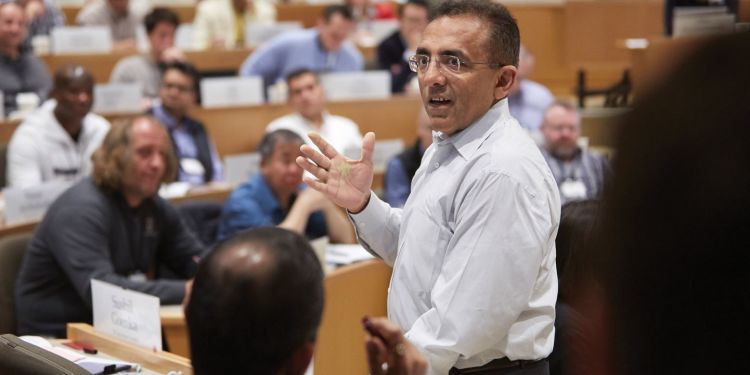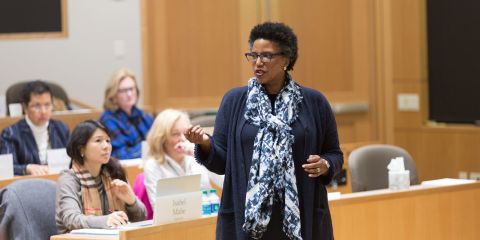WHY DID YOU START RESEARCHING BLACK EXECUTIVES?
I am not an expert in diversity and inclusion, but I had thought about marginalization, both as a child growing up in India, where I saw the marginalization of some minority groups, and as a student at Harvard studying sociology. Sociologists have studied how across the world, for centuries, different groups of people have been marginalized. I thought I understood racism in America—but I did not. George Floyd's murder and other recent tragic events really brought the problem home. My friend and coauthor, Frank Cooper, who is a senior black executive at Blackrock, agreed to help me learn more about this through our joint research. I did not start out to write a paper—I just wanted to learn, to understand what was really happening in America and what racism was.
HOW DID YOU CONDUCT YOUR RESEARCH?
To get a handle on the problem, we began by interviewing about a dozen black executives in depth—young black professionals in their 20s. We asked them to tell us their whole story, from the beginning to what they are doing now and where they are working. After that, we started meeting with focus groups of 8-10 people. We discussed their challenges, but also their ideas, asking "What do you wish your organization or your boss would do differently?"
I cherry-picked my sample, choosing people who went to top colleges and were working in blue chip companies. You would expect these people to be most likely to advance and to have positive experiences. All their companies had diversity, equity, and inclusion (DEI) programs and were talking a lot about it. I asked, "How many of you would recommend your company as a place to work for young black professionals?" I could barely get anyone to raise their hand. That was stunning. They would say, "Yes, my company is trying, but…."
This was one of the most emotional research projects I have ever done. I rarely tear up in an interview. But on multiple occasions, I really had tears in my eyes hearing people's stories. It was amazing. I tried to walk in other people's shoes as best I could. It's not possible for someone who hasn't lived it to walk in others' shoes, but as I learned more, I wanted to help everyone understand the challenges and find solutions.
WHAT WAS YOUR BIGGEST OVERALL TAKE-AWAY FROM THIS RESEARCH?
Most broadly, there is a huge disconnect between what people need and what organizations are actually doing. Many people have good intentions and many companies have DEI programs but those are not translating into real impact. Other studies bear this out. Most consulting firms and other research organizations have produced reports saying similar things.
The challenges executives face fall into three interconnected buckets. Black executives have a sense of isolation, they don't feel they can bring their true selves to work, and they experience a loss of confidence. Other marginalized or underrepresented groups also experience these challenges, but our research focused on Black executives.
WHY DO BLACK EXECUTIVES FEEL ISOLATED?
Many interactions between people are based on a common background. One Black executive said, "When I started to describe my background, colleagues were less interested because it was so different from theirs. They were more curious about each other's families than about mine." Interactions common in work relationships—friendly banter, invitations to lunch, drawing people out to understand who they are—often just don't happen for Black executives. One person said that going to lunch was a big deal in his company—it was how people networked and got things done. But no one ever asked him to lunch.
Many of the Black executives found their peers standoffish, perhaps because they were not used to being around black people. They concluded that their colleagues were just not interested in them. This kind of isolation goes beyond the personal. Those friendly questions naturally lead into career conversations, especially with the boss. What do you want to do? What are your ambitions? Where do you want to go? Black executives were seldom asked these questions.
WHY DON'T BLACK EXECUTIVES FEEL THEY CAN BRING THEIR TRUE SELVES TO WORK?
That concept can be confusing because we all wear masks at work. One of the most extreme examples is the workforce at Disney theme parks. As soon as those people come out from behind the scenes, they are on stage—happy, smiling, and helpful. In our research, we learned that this sense of being on stage is more acutely felt when you are Black. You have to be constantly masked up—vigilant and on guard.
One executive said he was not able to express anger because when a Black person, especially a large Black man, expresses anger, it is perceived as aggression. That is not true for someone who isn't Black. So many Black executives feel they have to be very mild mannered and agreeable, because any disagreement will be perceived as aggression.
At work, we are all being judged to some extent about our performance. But the level of scrutiny I heard about in these discussions was far greater than for most others. Imagine the stress of coming to work each day when you feel you are always being watched, can't speak up too much, and are always afraid of being judged. That makes people nervous, self-conscious, and very careful. The fear of being viewed negatively is immobilizing. One person expressed the sense of relief he felt when walking out of the office building because he could take his mask off. As I imagined having to feel that way every day, I found it very troubling.
WHERE DOES THE LOSS OF CONFIDENCE COME FROM?
Many respondents suffered from what others have described as imposter syndrome—feelings of inadequacy that persist despite evident success. These individuals feel chronic self-doubt and a sense of inadequacy that overrode any feelings of success or external proof of their competence. When these Black executives did not receive acknowledgment for good work and were not treated as a person with career advancement potential, their morale suffered. They felt no one had confidence in them. They were invisible. They were not given opportunities to work on challenging projects. Many of the executives we spoke with felt lonely, stressed, fearful, disengaged, insecure, and unable to deliver their best work because of the environment in which they were operating. They were surviving, but not thriving.
WHAT SOLUTIONS DID YOUR RESEARCH SUBJECTS OFFER?
I put it to them this way. "If you were going to create the workplace context where you felt like you were being given the opportunity to perform at your fullest potential, what would that look like? What are some fixes?" What they wanted can be clustered into 3 broad buckets–to feel (1) safe, (2) seen, and (3) supported.
My HBS colleague, Amy C. Edmondson, has researched and written a great deal about psychological safety in the workplace. Feeling safe means being able to express yourself, discuss difficult issues, take risks, collaborate freely with others—and even make mistakes—without repercussions. One Black executive found himself listening to a lunchtime discussion of a recent police atrocity. At first, he kept his mouth shut, but they kept asking him questions and he eventually shared what he thought. A week later in his performance review his boss told him, "Peers think you are very aggressive on racial issues." This experience left him confused, hurt, and not feeling safe sharing information that might later be used against him.
Safety in the workplace comes when your colleagues feel engaged with you, listening, communicating, understanding, and acknowledging you. Another aspect of safety came from seeing others like yourself in senior positions. If my goal is to move up, perhaps be in the C-suite someday, and I don't see examples of people who have done that, I will have fears about pursuing that goal. Keep in mind that Black executives make up 3% of management positions in finance and insurance, and 2% of management positions in IT. How does that feel if you are a young Black executive starting out? Most of the Black executives we interviewed felt safer when they could see other Black people in senior positions. That is one reason why many told us that employee resource groups, also called affinity groups, are especially effective—even a lifeline for some people. Black executives found it very comforting to find others with the same concerns, talk with them, and learn from their experiences. We need to create more peer networking opportunities where people feel genuinely connected—both with people like them and with people not like them.
WHAT WILL HELP BLACK EXECUTIVES FEEL SEEN?
If I am a Black executive, I want to know that others see me as a person, as a valued contributor, and as someone who is progressing over time. I want to look around and see people with intersecting identities close to mine.
How do we create more visibility for others who are different? I worked with a company a number of years ago where every division would make a presentation to the CEO about its initiatives. Some of the heads gave a younger person the opportunity to present. We need to give younger people, especially those who are different, a chance to shine.
HOW CAN COMPANIES TRULY SUPPORT BLACK EXECUTIVES?
Every company is delivering support programs—but they don't all provide meaningful mentorship. 87% of companies report having a sponsorship program. 33% of black employees report having one or more sponsors. 23% of black employees feel "a lot" or "quite a bit" of support at the company to advance. We need to do better.
If I am a Black executive, how will I get practical tools and opportunities? For some it was seeking help with basic things like—How do I reply to an email from my boss? How do I frame conversations? People need guidance on soft skills, honest feedback, and assistance developing and achieving career milestones. Some people said, "I don't have the support system where I can get advice from my parents, so I need a little more coaching—on some things others take for granted."
With respect to performance, many Black executives say there’s a lot of sugarcoating and a lack of real feedback. Managers have good intentions but treat them with kid gloves, not wanting to offend. They want to do the best job they can. To do that, they need the same kind of helpful, honest feedback others are receiving.
I wrote a case on Pete Carroll, head coach of the Seattle Seahawks, who said, "I really wanted to know what would happen if I treated everyone with great care." I interviewed the quarterback and a number of his players. Some had actually gone elsewhere and sought to come back to work with him. One explained how Pete made them feel supported. Supported is not the same as saying it doesn't matter how you perform. It's not the same as unconditional love. Supported means I have skin in the game in your success. I am going to do my best to help you perform at your potential.
ANY FINAL THOUGHTS?
Companies spend a great deal of time and money to hire and bring diverse talent into the organization. If we don't create an environment where they're going to thrive, then what's going to happen? They will walk out the door. Everyone wants to do a better job of supporting minority executives. How do you do it? Help people feel safe, seen, and supported. Create a welcoming environment for people who are not just like you.
Related Harvard Business Review Article: What Do Black Executives Really Want? By Frank Cooper III and Ranjay Gulati.








